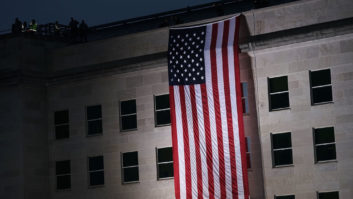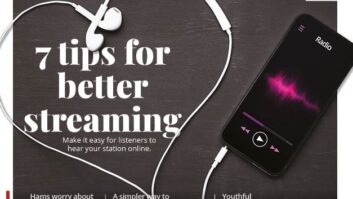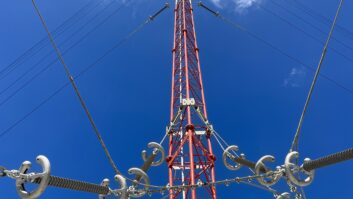On Black Tuesday, Stations Overcame Difficulties to Serve as Source of Much-Needed Information
NEW YORK The rules that govern radio programming were amended by many radio stations following the terrorist attacks of Sept. 11. Nowhere was this more true than in New York itself.
For the city’s residents, radio became one of its most important sources of information following the collapse of the World Trade Center. For one thing, in the crucial hours after the attacks several local television stations were knocked off the air when their transmitters disintegrated with the collapse of the North Tower.
Radio stations located in the city and across the river in New Jersey faced a host of technical challenges in their pursuit to provide up-to-the-minute coverage. Some stations went off the air because their transmission equipment was located on top of the building, prompting station engineers to scramble to find alternative sites and buy new equipment to get back on the air.
A number of stations opted not to play commercials in the hours and days after the attack.
Throughout the New York City market, the most common trend for these stations was a temporary change in programming after the incidents.
With the pressure to be a vital source of news and information for traumatized listeners, morning DJs at music stations suddenly became newscasters. Stations without news departments tried to provide as much information as possible on the unfolding events. Programming personnel rushed to arrange for network programming.
Among the stations affected by the disaster was WNYC, an NPR affiliate on both the AM and FM bands. According to Dean Cappello, WNYC’s vice president of programming, the station had to overcome several hurdles to cover the breaking events.
The station’s transmission equipment for its FM signal was destroyed with the collapse of the North Tower and its staff had to be evacuated on the day of the attack because of the office’s close proximity to the World Trade Center.
Despite these problems, Capello said WNYC contributed to NPR’s wall-to-wall coverage of the events, with reporters filing reports from various parts of the city. He and one of WNYC’s reporters saw the collapse of one of the towers.
“We kind of went on auto-pilot,” he said. “Reporters somehow got on air on NPR even though cell phones were not working.”
Eventually things stabilized, he said, after WNYC set up a temporary studio at the city’s NPR bureau and temporary offices at WNET and other sites within NYC. Soon after the attacks, he said, the station also started broadcasting on a donated FM frequency that belongs to WNYE, the station licensed to the New York Board of Education. Later that week, WNYC personnel also put the station’s FM signal back on the air from the Empire State building.
Cappello said WNYC carried NPR programming, which was centered around the tragedy, 24 hours a day for a few days after the attack and then transitioned back into some of its own programming. He expected the station would soon return to its normal programming.
He expects there will be some changes to accommodate continuing news about U.S. military activities, and station executives are considering whether to expand the news department to cover the continuing story.
Info sources
For stations without news departments, the abrupt transition to an all-news format following the terrorist attacks was not easy.
“(The news talk format) was a major adjustment for us. Our jocks aren’t specialized in news,” said Julia Lopez, programming coordinator and weekend deejay at WKTU(FM) in Jersey City, N.J. “Our station was here to give out the information our listeners were asking for.”
One of several stations with transmission equipment on top of the Trade Center, the station went off the air momentarily but switched to its backup site at Times Square.
During that first week, Lopez said the R&B station became a source of talking and healing, taking several calls from listeners and providing information on hotlines and relief funds.
Many stations, even those without a news department, scrapped or reduced their music programming and added news or listener calls into their schedules. Lopez said it was an uncompetitive time for the New York City radio market. She said WKTU could easily arrange to get network news feeds from CBS and NBC in the hours after the tragedy.
WKTU was not the only station that used network feeds to supplement its local news coverage.
Associated Press Radio provided many news feeds to stations across the country, delivering audio news in many forms, said John Jones, manager of marketing communications for Associated Press Broadcast. Jones said offered subscribers 53 straight hours of news coverage on the events.
Stations also used the AP Radio’s wire service for their Web sites, said Jones. AP Radio members who used AP’s streaming All News Radio for their Web sites reported thousands of listeners tuning into the service. Many of the stations also use the AP’s graphics and text services for the Web sites.
In the days after the attacks, programmers for radio groups large and small grappled with what material to present to serve local community needs and tastes. Internet rumors surfaced that Clear Channel Communications had circulated a list of banned songs to its more than 1,200 stations.
Lopez said Clear Channel, WKTU’s owner, did not send out any directives to carry certain feeds, make programming changes or refrain from playing certain songs to either WKTU or its sister station, WHTZ(FM).
In a statement released on Sept. 18, Clear Channel denied asking program directors to stop playing certain songs, saying decisions about adjusting programming would be made at the individual stations.
Lopez said WKTU chose not to play commercials for two days. When it did transition back to playing music a few days after the attacks, the station played soft rock rather than its normal CHR/rhythmic format to reflect the mood of its listeners, and aired frequent news updates.
Gauging Community Needs
Other stations took their cue from their listeners as well.
After getting back on the air 59 hours after the attacks from a backup site on top of the Empire State building, Spanish Broadcasting System’s WPAT(FM) went to a commercial-free, all-news talk format.
Because WPAT and its sister station, WSKQ(FM), cater to a Spanish-speaking audience – a population that makes up about one-third of NYC’s 5 million listeners – they had the added responsibility of responding to the needs of that community, Davis said.
“Hispanics listen to more radio than watch television,” said WSKQ/WPAT General Manager Carey Davis. “Radio is a shared New York experience.”
Though they were also unprepared to serve as newscasters, Davis said the WPAT DJs gave out news on the search for the victims, took listeners calls and played the national anthem and “God Bless America” frequently.
The station also delved into what Davis calls “inspirational programming” ¾ broadcasting a Catholic mass for the victims on the day President Bush declared as the national day of mourning. Davis said the station received an overwhelmingly positive response from the listeners, many of whom are Catholic, who were looking for a source of solace.
“People will remember for years how the media handled this story,” he said. “The outpouring of gratitude for broadcasting the mass was tremendous.”
A week after the attacks, Davis said the stations were still doing news and traffic updates more often than usual. “We’re getting back to normal, but it’s anything but normal out there,” he said.
WPAT had to reschedule many commercials in its transition back to regular programming. Davis said WPAT lost approximately $500,000 from being off air from Tuesday after the attacks until Thursday and then not running commercials until after the mass on Friday.
Ad replacement
Newstalk station WABC(AM) is an example of how NYC stations not directly affected by the attacks changed their programming as a result of the events.
WABC came out even in terms of ad revenue, said WABC Program Director Phil Boyce. Some WABC advertisers, he said, cancelled spots, but that time was taken by insurance companies and others eager to get their spots on air for families affected by the tragedy.
The station was commercial-free on the day of the attacks and returned to a limited schedule the next day. The station waited six days to return to a normal schedule.
Boyce said WABC decided to forgo its usual schedule of syndicated programming the week after the attacks to provide wall-to-wall coverage of the events with plenty of live and local programming, including call-in shows hosted by former New York City mayor Ed Koch, terrorism expert Harvey Kushner and members of the clergy.
Boyce said news/talk stations like WABC performed a unique function during the crisis.
“In times like this, listeners don’t know what to think,” Boyce said. “We give them opinions, positions and a chance to think things through.”
Boyce said he did foresee some permanent changes to WABC’s program schedule in response to the attacks and the possibility of war, but could not discuss them publicly as of late September.
No changes
One New York station with transmission equipment on top of the World Trade Center, WKCR(FM), made no changes to its programming. The Columbia University student-run station was knocked off the air on Sept. 11 and did not resume operations for about 80 hours. It then started broadcasting from a low-power transmitter at the school.
Because the station ceased its news operations over the summer and did not plan to start it up again until later in the fall, the station could not provide news updates so the management decided to stick with its usual programming of jazz and classical music, said Joseph Kim, the director of operations and engineering.
Instead, various program hosts informed listeners about relief funds, blood donation opportunities and hotlines available to them.












